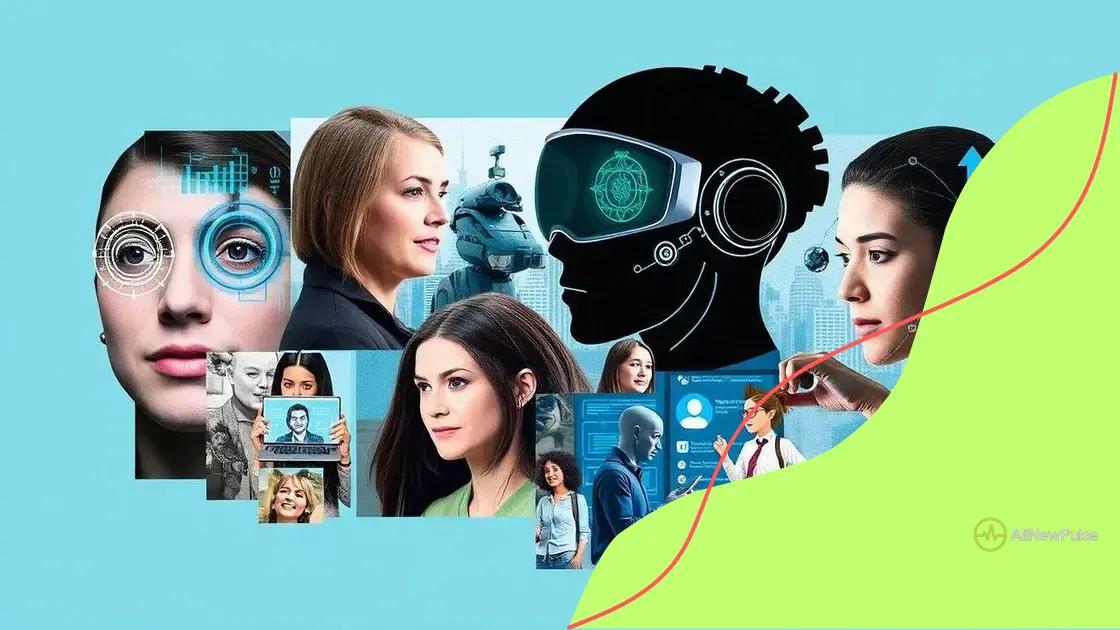Debates concerning the ethics of artificial intelligence

Debates concerning the ethics of artificial intelligence center on transparency, accountability, and the importance of inclusion to develop fair and responsible AI systems that serve society positively.
Debates concerning the ethics of artificial intelligence have escalated as technology evolves. Have you ever wondered about the moral responsibilities we bear in creating intelligent machines? Join us as we delve into these compelling discussions.
Understanding ethical implications of AI
Understanding the ethical implications of AI is crucial in today’s technology-driven world. Artificial Intelligence impacts various sectors, making it essential to evaluate its moral considerations.
Key Ethical Concerns
One major concern is bias in AI systems. Algorithms can unintentionally perpetuate existing prejudices. This can lead to unfair treatment, especially in areas like hiring and law enforcement.
- Algorithmic discrimination can impact minorities.
- Transparency in AI decision-making is lacking.
- Data privacy is at risk with widespread AI use.
Another ethical aspect involves accountability. When AI systems make mistakes, it raises questions about who is responsible. Is it the developer, the user, or the machine itself? This complexity needs careful consideration.
Impact on Society
The impact of AI on society is profound. It can improve efficiency, but it may also lead to job displacement. As machines take over tasks, workers must adapt to new roles. This transition requires a thoughtful examination of the implications for the workforce.
Furthermore, AI’s capability to influence decisions creates a need for regulation. Policymakers must find a balance to harness AI’s benefits while mitigating risks. Public discussions around these topics can guide responsible AI development.
Key arguments for and against AI ethics
The ongoing debates around AI ethics feature various key arguments on both sides. One argument in favor of strict AI ethics is the need to protect individuals from potential harms caused by technology. Ensuring fairness in AI systems can help avoid biases that unfairly disadvantage certain groups.
Arguments Supporting AI Ethics
Proponents of ethical guidelines argue that:
- Ethical AI promotes trust and acceptance in technology.
- It can prevent discrimination and uphold human rights.
- Clear ethical standards support innovation in a responsible manner.
Moreover, proponents believe that ethics in AI can lead to better outcomes for society. When AI is designed with ethics in mind, the technology can contribute positively to various fields, including healthcare and education.
Arguments Against Strict AI Ethics
Conversely, critics argue against rigid ethical frameworks. One significant concern is that excessive regulation could stifle innovation. In a rapidly evolving field, overregulation may hinder companies from developing groundbreaking solutions.
Additionally, there is a belief that ethical principles can be subjective and vary across cultures. This could lead to conflicts in the implementation of AI across different regions.
- Innovation risks being slowed down by regulation.
- Ethical standards may clash with cultural values.
- AI developers might face challenges in compliance with conflicting regulations.
Both sides of the argument highlight essential considerations. Understanding these viewpoints is crucial as we navigate the future of AI technology.
Real-world examples of AI ethical dilemmas

Real-world examples of AI ethical dilemmas illustrate the complexities of implementing technology responsibly. These situations show how artificial intelligence interacts with human values in unexpected ways.
Facial Recognition Technology
One prominent example involves facial recognition technology used by law enforcement. While it can enhance security, studies reveal high rates of misidentification, particularly among minorities. This can result in wrongful arrests and increased distrust in the police.
- Bias in algorithms can lead to serious consequences.
- Transparency from companies is often lacking.
- Accountability remains a significant concern.
As cities implement this technology, understanding its ethical implications is vital for citizens.
Autonomous Vehicles
Another ethical dilemma arises with autonomous vehicles. In an emergency, self-driving cars may have to choose between conflicting outcomes, such as whether to harm passengers or pedestrians. These decisions raise questions about how responsibility is assigned and what moral framework guides these choices.
Regulators and manufacturers must work together to develop guidelines that address these serious dilemmas.
Social Media Algorithms
Social media platforms also present ethical challenges. Algorithms decide what content users see, influencing their beliefs and behaviors. This can promote misinformation and create echo chambers, where individuals only engage with viewpoints similar to their own. The ethical consideration here is the responsibility these companies have to ensure public discourse remains healthy and informed.
Understanding these real-world examples sheds light on the pressing need to address ethical concerns as AI continues to evolve.
Regulation and governance of AI
Regulation and governance of AI are critical topics as technology continues to advance rapidly. As artificial intelligence evolves, establishing a framework for its ethical use is necessary. Without proper governance, the potential for misuse and harm increases.
The Need for Regulation
Regulating AI helps protect the public from negative consequences. For instance, unregulated AI can lead to biased decision-making, putting certain groups at a disadvantage. Companies must be held accountable for how they design and implement AI systems.
- Regulation ensures fairness in AI applications.
- It protects consumer rights and promotes trust.
- Clear guidelines help prevent technological abuse.
Additionally, regulation can encourage innovation by setting a clear pathway for companies to follow. When developers understand the rules, they can create solutions that align with ethical standards.
Government and Industry Collaboration
Governments play a crucial role in shaping AI policies. However, they must collaborate with industry experts to ensure regulations are practical and effective. This partnership can lead to the development of guidelines that address diverse needs.
Engaging multiple stakeholders, including the public, is vital. By gathering input from various sectors, regulations can be more balanced and fair. This collaborative approach can lead to greater acceptance of AI technologies among consumers.
International Considerations
AI governance must also consider international implications. Different countries have varying perspectives on AI ethics, impacting global standards. Establishing international agreements can help harmonize regulations and facilitate cross-border collaboration.
As AI technologies transcend borders, a unified approach to governance becomes increasingly important, ensuring that ethical principles are upheld worldwide.
Future trends in AI ethics
Future trends in AI ethics will play a significant role in shaping the technology landscape. As artificial intelligence continues to advance, new ethical challenges will arise. Understanding these trends can help society navigate the complexities of AI responsibly.
Increased Focus on Transparency
One trend is the growing demand for transparency in AI systems. Consumers want to know how decisions are made, and companies are responding by striving for clearer explanations of their algorithms. This shift can build trust and accountability.
- Transparent AI builds consumer confidence.
- Clear explanations can reduce bias in decision-making.
- It encourages companies to be more responsible.
Additionally, regulatory bodies may implement guidelines requiring companies to disclose their methods and data sources.
Ethical AI Frameworks
Another significant trend is the development of ethical AI frameworks. Many organizations are recognizing the importance of constructing guidelines that emphasize fairness, accountability, and human rights. As AI becomes more integrated into daily life, these frameworks will become essential.
Incorporating ethics into AI design can improve outcomes and ensure technology benefits everyone. Stakeholders, including developers and policymakers, will need to collaborate closely.
Emphasis on Inclusion
As AI technology evolves, there will be a stronger emphasis on inclusion. Ensuring diverse perspectives are represented in AI development is critical to prevent bias and promote fairness. Companies will need to prioritize including voices from various backgrounds in their teams.
This inclusivity will enrich the development process and create AI systems that are more aligned with societal needs. With diverse teams, the potential for innovation in ethical AI practices increases.
FAQ – Frequently Asked Questions about AI Ethics
What is the importance of ethics in artificial intelligence?
Ethics in AI ensures technology is developed responsibly and fairly, protecting individuals from potential harm.
How can transparency improve trust in AI systems?
Transparency allows users to understand how AI makes decisions, which helps build trust and accountability.
Why is collaboration needed between governments and tech industries?
Collaboration helps create effective regulations that balance innovation with ethical considerations, benefiting society as a whole.
How does inclusion contribute to ethical AI development?
Inclusion brings diverse perspectives that can lead to fairer and more effective AI technologies, reducing bias.





